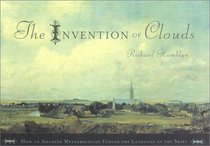There's a song with the refrain, "An empty sky is my best friend, and I just cast my fate with the wind." Well, maybe for some people, but I like clouds. I mean I really like clouds. Especially in Florida---where I live---where the clouds are often beautiful, except the hurricane ones. However, while I knew clouds had names, I never knew which clouds had which names and didn't really care. Then I ran across this book and decided it was time I learned more about them.
Unfortunately, I found it a difficult book to read. In the first chapters the author jumps back and forth between Luke Howard---the first man to give clouds meaningful names---and the ancient philosophers' thoughts about clouds. While I took a lot of philosophy courses in college while getting my first degree, now I'm more like Sergeant Joe Friday, as in "Just the Facts, Maam."
If like me you don't care for a philosophical discussion, then you can probably skip the first two or three chapters in this book and not miss much. In the following chapters, the author covers Howard growing up, dealing with a father who didn't like him daydreaming, getting married and trying to earn enough to support a family and then deciding to "organize" clouds. And he did a good job at that, as he went from being unknown to celebrated overnight. You might even call him an early 18th century reality show star, except he had an education.
The author follows Howard's career in meteorology through the century and the failed attempts by others to revise Howard's names, although later a few successful additions were added. Plus, the author shows how Howard's efforts spilled over and affected the efforts of famous painters and poets. I guess this was because Howard wasn't all that interested in being famous and he led a somewhat simple life. Certainly nothing wrong with that, as I wish more so-called celebrities would follow his example. However, perhaps the author had to find enough information dealing with clouds to fill out this book, so that is why the painters and poets are included.
So the next time I take a break to stop and gaze in wonder at the beautiful clouds over Florida, I'll do it with more knowledge than I did before. As now I know in more detail what causes lightening, snow, hail and even rain.
There is one bit of cloud trivia I found amusing. As the book states, "It is sad to relate, though, that cumulonimbus, the highest cloud of all, is no longer classified as cloud nine---the meteorological origin of that happy expression."
Unfortunately, I found it a difficult book to read. In the first chapters the author jumps back and forth between Luke Howard---the first man to give clouds meaningful names---and the ancient philosophers' thoughts about clouds. While I took a lot of philosophy courses in college while getting my first degree, now I'm more like Sergeant Joe Friday, as in "Just the Facts, Maam."
If like me you don't care for a philosophical discussion, then you can probably skip the first two or three chapters in this book and not miss much. In the following chapters, the author covers Howard growing up, dealing with a father who didn't like him daydreaming, getting married and trying to earn enough to support a family and then deciding to "organize" clouds. And he did a good job at that, as he went from being unknown to celebrated overnight. You might even call him an early 18th century reality show star, except he had an education.
The author follows Howard's career in meteorology through the century and the failed attempts by others to revise Howard's names, although later a few successful additions were added. Plus, the author shows how Howard's efforts spilled over and affected the efforts of famous painters and poets. I guess this was because Howard wasn't all that interested in being famous and he led a somewhat simple life. Certainly nothing wrong with that, as I wish more so-called celebrities would follow his example. However, perhaps the author had to find enough information dealing with clouds to fill out this book, so that is why the painters and poets are included.
So the next time I take a break to stop and gaze in wonder at the beautiful clouds over Florida, I'll do it with more knowledge than I did before. As now I know in more detail what causes lightening, snow, hail and even rain.
There is one bit of cloud trivia I found amusing. As the book states, "It is sad to relate, though, that cumulonimbus, the highest cloud of all, is no longer classified as cloud nine---the meteorological origin of that happy expression."




